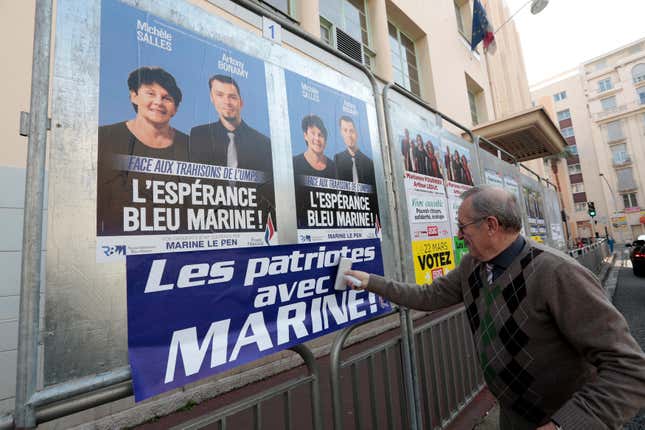You could be forgiven for thinking that the French never stop voting. And on Mar. 22 and 29, they will be at it again in departmental elections—local votes to elect local councils.
These are an important yardstick for the presidential election to come in 2017. But whatever the outcome of this two-part vote, the results will shake up French politics forever. For the first time, 50% of the seats on local councils will be given to women.
Egalité
As a result of radical reforms set in motion by the socialist government, each canton (ward) will elect, not one but two representatives, a man and a woman. They will stand on the same ticket, known as a binôme.
Whatever else happens across the two rounds of voting, France will wake up on Mar. 30 with departmental councils in which women make up 50% of the members. That’s a dramatic shift, since women make up just 14% of the councils now.
The system is straightforward. Each person will vote for a ticket with two names on it, and both will sit in the departmental assembly. To avoid doubling the size of the assemblies, boundaries have been redrawn and the number of cantons halved to roughly 2,050, electing 4,100 councillors.
It is a mixed, dual-member, two-round majority system. A pair will be elected in the first round if they gain an absolute majority and if the votes cast for them constitute 25% of registered voters (not 25% of the votes cast).
If these conditions are not met, there is a second round. The general rule of thumb is that any candidate who has polled 12.5% of registered voters can go through to the run-off. The same is true here.
However, given that the turn-out may be low, the electoral code has been amended for departmental elections to allow the second placed pair to progress to the run-off even if they get less than 12.5%, otherwise there would be no contest. It may even be that the first-place pair does not achieve the threshold, in which case the first two tickets go through by right, but not more than two.
Once all this is over, France will have an elected body of regional representatives—half men and half women. Although the exact responsibilities of the new councils are yet to be set it stone, they are likely to go on to make decisions about the bread and butter issues that keep a local area running. That includes social welfare, school meals—a high-profile issue at the moment—and local infrastructure and cultural projects.
Presidential yardstick

Aside from setting an extraordinary example on equality, these elections will also set the tone for the next race for the presidency.
The départementales will provide an indication of how far Marine Le Pen’s far-right Front National has embedded itself in local administrations. That, in turn, will give a flavor of its prospects in 2017.
Le Pen hopes to repeat her party’s performance at the 2014 European elections, when it came first with 25% of the vote. This would help substantiate her claim that the FN is now France’s first party.
Until now, the Front National has struggled to win seats at this level and in majoritarian elections, but this time it has managed to put up candidates in 80% of the constituencies—quite a feat. The Front National hopes to take outright control of a handful of departments, in the Nord-Picardie region (its new heartland) and in Provence (its old one), whilst also causing ructions at points in between.
The elections will also test of the ability Nicolas Sarkozy’s right-wing UMP to resist the rise of the FN (and the temptation of alliance with it) as well as the likelihood of defeating the Socialist Party. For the UMP, the departmental elections will determine who is to be the opposition in the forthcoming presidential campaign.
The ruling Socialists face a rout. President François Hollande saw his personal popularity revived in the wake of January’s Charlie Hébdo atrocities because he was seen to handle himself with poise and dignity, but that will not save the left at the village pump. At the moment, the socialists control 60 of the 90-or-so councils. If they lose only 20, they will emerge from the election delighted.
For all these reasons, these elections are being read like a national mid-term election. But more than this, they mark a new era for politics and may well set an example to other countries when it comes to representing women in positions of power.
